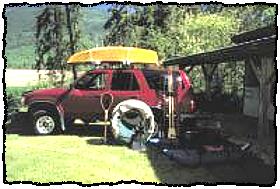Planning to prevent
DISASTER

By Duncan Hardie
PART ONE: The Lessons
OK - so I'm standing on a gravel bar on the Crowsnest River in southern Alberta,
watching a huge rainbow trout sipping blue-winged olives. It's late September and
there's a wonderful mountain nip in the air. To my dismay, I can't quite reach the rainbow
from my bank, so I decide to move to the other side, which means crossing the bar and
a small off-shoot of the main river. Crouched over so as not to be seen by the trout, I head
across the bar and (why I did this I'll never know) at the same time trying to tie on a new fly.
In a milli-second, I'm engulfed up to my neck. Only outstanding gymnastics save me from
being pulled under the bank - who knows to what end!
I couldn't believe what happened. Three hours from Calgary, 15 minutes on the river and
there I was, soaked from head to toe.
'Gimme a break!' I yelled to the mountains. Oleh, my partner, was nowhere to be seen and
the car was a good half-hour's walk from the river. I collected my thoughts and quickly realized
that it was damn cold and I'd better do something about it soon. Luckily, before we left Calgary,
Oleh had insisted we take extra clothes 'just in case'. Just a few weeks before he had done
an ass-over-teakettle on the river, which had ruined his day. I remember him joking about it,
but here I was in the same embarrassing situation. I usually never take a complete change of
clothes on a day trip. On this occasion, I was saved by something I'd perceived as tiresome,
but which turned out to be sage advice.
Lesson 1: A drowned rat makes a lousy fishing partner.
A few years ago, Chris and I had the opportunity to do a video in Labrador. I spent most
of the Spring dreaming about those wild Eagle River salmon cartwheeling in the sun. The trip
was being arranged by mutual friends and Chris told me not to worry, as "everything was
being taking care of!" All I had to do was show up.
The warning bells should have sounded in my head, but this was Chris, my fishing soul mate!
What could go wrong?
Inevitably, everything that could have gone wrong did. We spent more time weather-bound
in Goose Bay and on float planes than we did fishing. After four days languishing in the hotel,
I stared at the ceiling and yelled "Why me, Lord? Why can't the trip of a lifetime work out
just once?"
There was no immediate response, but the phone did ring a few hours later and, before I
knew it, we were being whisked north on a float plane. After a fairly long trip, we set down
on a lake, got our rods out and in a few minutes I had my first arctic char to the net. Within
minutes we were being eaten alive by blackflies, bug dope and all, but I didn't care, for the
char were taking the fly with reckless abandon. I was in heaven.
"Day's getting on," yelled the pilot. "We'd better get going."
"But we just got here," I shouted back.
"We just came here to check out the camp. The fishing is a bonus."
I turned to Chris. "We did?"
As I recall, he did have the grace to look somewhat puzzled. A few minutes later we were
soaring over the wild Labrador landscape again, heading back to Goose Bay with 500 air
miles and five minutes of fishing under our belts.
Lesson 2: Never let your best friend do all the planning.
Frank and I were sitting on the porch overlooking the Belize River. We had just met and,
after a few pleasantries and dinner, had returned to our cottage along with the other
members of our party to gear up for the following day's fishing. We would be partners
for the rest of the week. I had looked forward to this trip all winter and was ready for
a saltwater grandslam. The bonefish and permit were on the flats and the tarpon were in,
and although I knew the fishing was not going to be easy, I felt lucky.
Our neighbors, John and Don, had brought enough gear to stock a tackle shop. We
wondered how they had managed to get it all on the plane. We were amused. Little did
we realise that the last laugh would be theirs.
We started pulling out our gear. Suddenly, Frank let out a wail of disbelief. "I can't believe it,
I just can't believe it!"
"What can't you believe?" I replied.
"My wife put out the wrong rod case. These are my striped bass rods."
"You let your wife pack your rods? Are you nuts?"
It wasn't the right thing to say at the time, now that I look back. Frank had been out of town
on business and had just managed to catch the flight in Boston after a whirlwind tour of his
fishing cupboard at home, followed by a mad dash to the airport. But the damage was done.
Guess who was delighted to lend him a full set of tarpon gear? That's right - the guys next door.
After a day's tough but satisfying tarpon fishing, our guide Nathaniel suggested that we
would try for bonefish and permit the next day. After dinner I pulled my bonefish rod out
of the case and began to thread the line through the guides - and stopped. The first eye
was missing! I couldn't believe it. I had used this rod at the cottage the week before. How
could the eye be broken? It was my turn to let out a string of expletives.
Later that evening I was able to borrow a rod from, you guessed it, the guys with the
tackle shop next door.
Lesson 3: Never let your wife pack your gear - ever.
One of the joys of fly fishing is reminiscing with friends, and it's always easy to laugh
at disaster after the event. But, at the time, disasters are rarely laughing matters.
The secret is to make sure they don't happen.
PART TWO: Using The Lessons - How To Avoid Disaster:
1. Research your options thoroughly and take the time to plan your trip.
2. Develop a check list and don't leave home until everything is checked off!
3. Find out what equipment fits the situation and make sure you always take backup.
4. Check all your equipment before you leave home.
5. Read everything you can about your destination. Find out from friends if they have
fished the area or know of anyone who may have been to the same destination.
6. Phone ahead and in this age of E-mail, be investigative. Most lodges will be more
than happy to give you information on fishing conditions, flies, the equipment you need
(clothing, etc.) and of course, the best time to be there.
7. Always have a contingency plan and leave nothing to chance. There is nothing 'for sure' in
fly fishing and you can be sure what can go wrong will.
 Sounds simple? Why do I never listen to my own advice!
Sounds simple? Why do I never listen to my own advice!
Honey, don't pack my rods! ~ Duncan Hardie
About Duncan Hardie:
Duncan has been a passionate fly fisher for the past 40 years. He is an accomplished fly tyer,
occasional casting instructor and an active conservationist. A professional marine biologist,
he is presently Director of the Science Policy Branch at Environment Canada. His present
passion is saltwater fly fishing for tarpon, bonefish and permit. He lives in Ottawa Canada.
|



